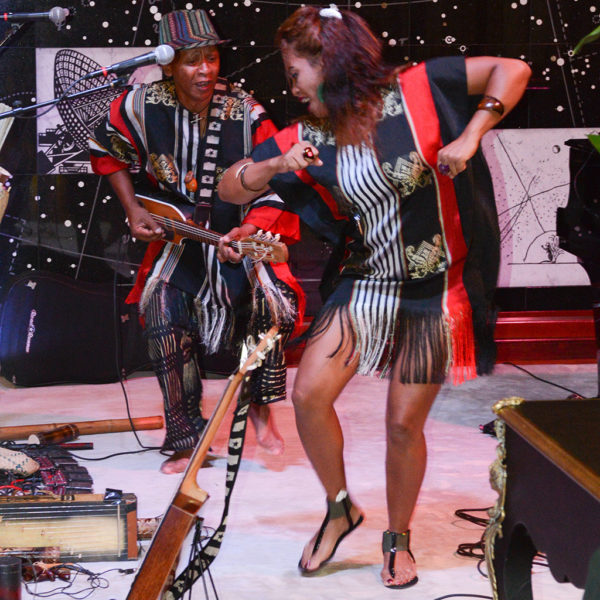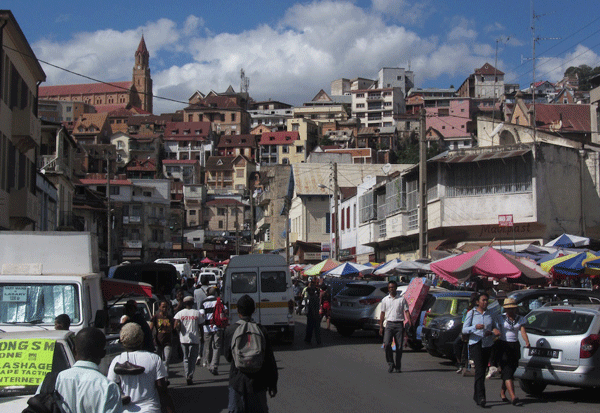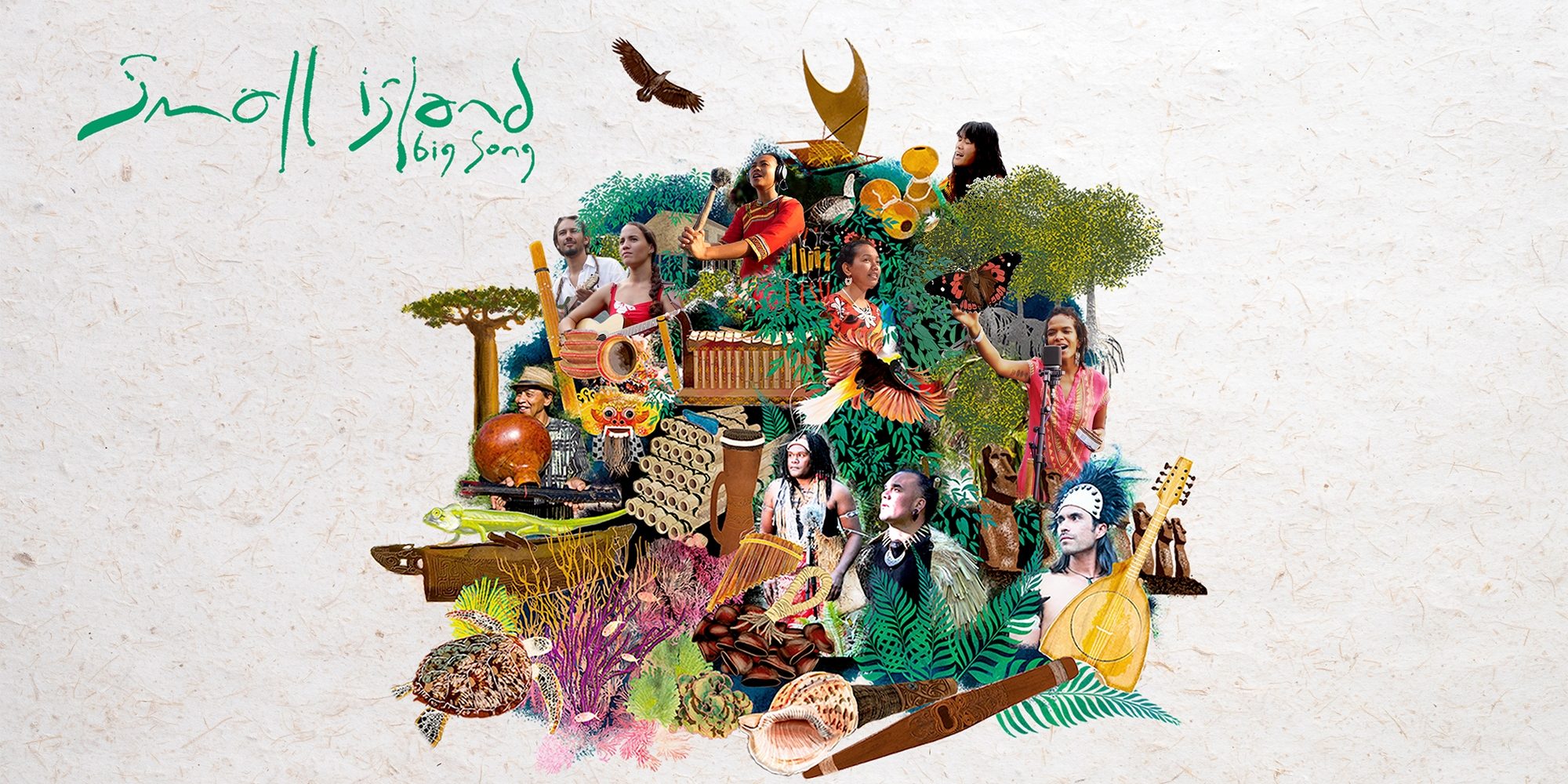Small Island Big Song is a multimedia project that aims at nothing less than uniting all the island cultures of the Pacific and Indian Oceans. Founders Tim Cole and BaoBao Chen see all of these diverse environments and communities as part of one big, 5,000-year-old diaspora. The project began in 2015 with a debut album, released in 2018, and a set of tours. It carried on during the pandemic with remote meetings and recordings, and now Small Island Big Song is out with a second album, Our Island, and a tour in the United States, including a show at Symphony Space in New York City on March 18. You can find out all about the project and tour here.
Afropop’s Banning Eyre reached Tim and BaoBao on the road to learn more about their vision and progress on a remarkable global journey. Here’s their conversation.
Banning Eyre: Where am I reaching you?
Tim Cole: In Richmond, Virginia, in a hotel room overlooking a McDonalds.
How exotic. Well it's great to speak with you guys. We met briefly at WOMEX some years ago. As you know, Africa is our focus on this program, and we've visited Madagascar three times. One of your artists, Sammy, is a good old friend of ours. But I've also on my own had the experience of being the music person on three expeditions into the territory you explore, one in Borneo, one in Madagascar and the Seychelles, and most recently in French Polynesia, where I got some experience playing the Polynesian ukulele.
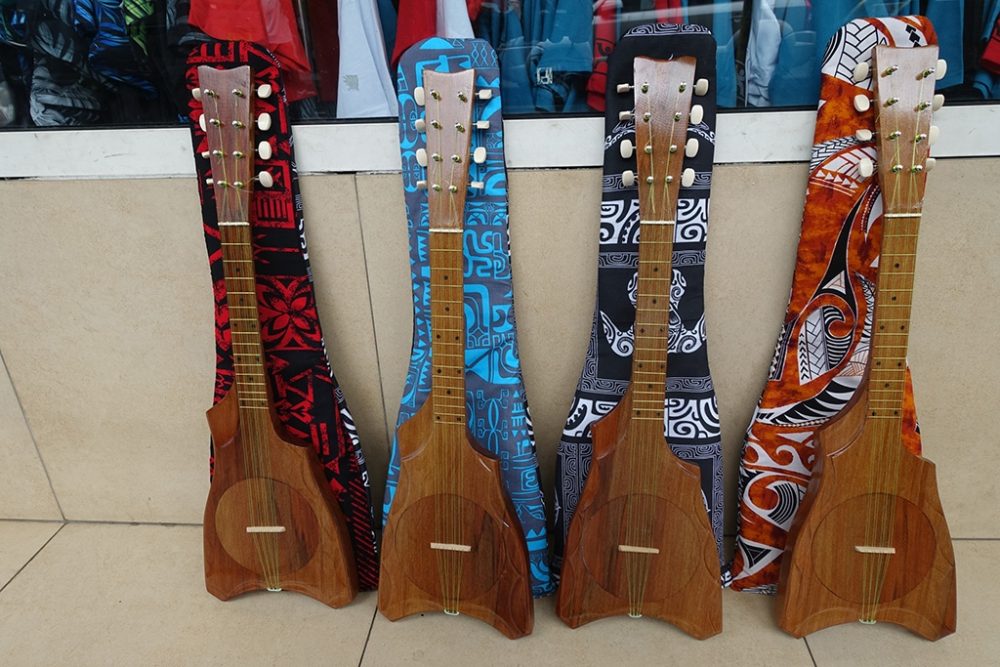
BaoBao Chen: Nice. You got that one in Tahiti?
Yes. And as we visited various islands, I found opportunities to sit in with local musicians. It was great fun. But one of the things that really struck me about Polynesia was the way people think about the ocean. The idea was that Europeans tended to look upon the ocean as something that separates the islands, whereas the Polynesians looked at the ocean as something that connects them. Your project is dealing with the culture, aesthetics and environmental challenges of islands. Talk about that.
Tim: Absolutely, well, with Small Island Big Song, I guess there are a few things to say. One is that everyone represents the voice of a different island in the Indian or Pacific Ocean. They are all united by a common heritage. The first people to cross the horizon, the seafarers, were actually the first people to settle and live in these places: Madagascar, Rapa Nui (Easter Island), Hawaii, Taiwan, Papua New Guinea, New Zealand, Borneo… These are the names we have now for these places, but they had their own names before. They all share elements of culture and language.
BaoBao: Now that we’re on the road, almost every day, Sammy from Madagascar will discover some common word with Taiwanese or a language from Papua New Guinea. It actually happened last night. It turns out they have the same word for "ear." And they have the same word for the number five.
Tim: And also "mother." We have a lot of prejudices. Most people see Madagascar as part of Africa, whereas culturally, it has strong ties with the Pacific. We’re not making big statements about these things. But there are musical connections. The valiha in Madagascar is actually an instrument that originated in Borneo.
BaoBao: And before that, Taiwan.
Tim: So that's one thing, this connection that everyone shares. It's a way to talk about our human narratives and relationships to the earth and to nature and to our homelands. It takes a different sensibility to think that the ocean unitesus. Beyond the things we do that kind of separate us, our prejudices and so on, there's common ground. Among the people of the ocean, not just these islands, there is a unity.
So we think of the voice of islands. And now that we’ve reached the Anthropocene [a geological epoch featuring significant impact from human activity], we're absolutely together as a global community impacting the environmental fabric and ecosystems worldwide. We live on an island, and that is our island: it's Earth. That's why the new album is called Our Island.
I find it very interesting to think about how these islands were gradually populated over the centuries. In the trailer for your original film for this project, you present Taiwan as a starting point for that history. How far back are we talking?
BaoBao: For me, that has been a learning experience. We first heard this said in Vanuatu where we were filming. When we got there, the elders looked at me and said, "Where you from?" When I said I was from Taiwan, the elders said, "Oh, I know Taiwan because that's where our ancestors come from." I was really surprised to hear that because usually when people hear you are from Taiwan they talk about the political tension with China and the Taiwan Strait. But this was the first time for me to actually hear this story.
So we went back and did a lot of research and we found out that there's evidence showing that around 5,000 years ago, the Taiwanese indigenous people had navigation skills and the ability to build outrigger canoes, and just following the currents, they went out to the Philippines and settled there, and then Borneo, Malaysia, Indonesia, and later across the Pacific and the Indian Ocean to Madagascar. The evidence includes language, as we mentioned, and also there's a tree called the paper mulberry tree, used to make clothing. They call it tapa cloth.
Yes, I encountered tapa in the Marquesas Islands.
BaoBao: That tree lets you trace the migration, the route of where the seafarers went. It's very fascinating to discover all these things. And when the musicians meet, they discover these common connections with each other, as Tim was saying. We might have different views about different parts of the world, but really we’re finding these families, these connections, through music.
Tim: Before colonization and the emergence of all the ways we see the things now through our lenses and preconceptions, our views and personal narratives, there are stories. That's what we're trying to break down a bit, even just in the languages that people sing in and the instruments they play in all these places. There's a knowing in there, embodied in these musicians who keep these traditions alive. The artists that we seek out are the ones who have chosen to keep alive their cultures and musical lineages, but in a contemporary way. They're not stuck in the past, but they are carrying that thread.
So you really are tracing a coherent cultural diaspora. But you know, 5,000 years is a long time in human history. It's hard to wrap your mind around that span of time. I understand from reading the history of how the Polynesian islands were ultimately populated, there was a lot of confusion, a lot of wrong theories that got thrown out right up into the mid-20th century. We now know that those were some of the last islands to be populated and settled. But over thousands of years, a lot changes, and on many of these islands the culture was radically interrupted by the arrival of Europeans with guns and especially diseases that wiped out huge percentages of the populations in a relatively short time. That can be catastrophic for the preservation of culture. We always say at Afropop that music is encoded history. If you study it closely, you find all these clues.
Tim: That's our belief too. But remember, we don't have to understand it all in our head. You can just know the feelings that carry through these musical lineages, particularly in the collaborations that happen when these musicians find these common points of reference. We are not anthropologists, so we’re not trying to push any point of view. We're trying to create cultural statements, expressions from people who carry the lineage, who grew up on these islands, who know the smell of the morning, the feel of the ocean coming across their land as the sea level rises. They embody this knowledge in their music.
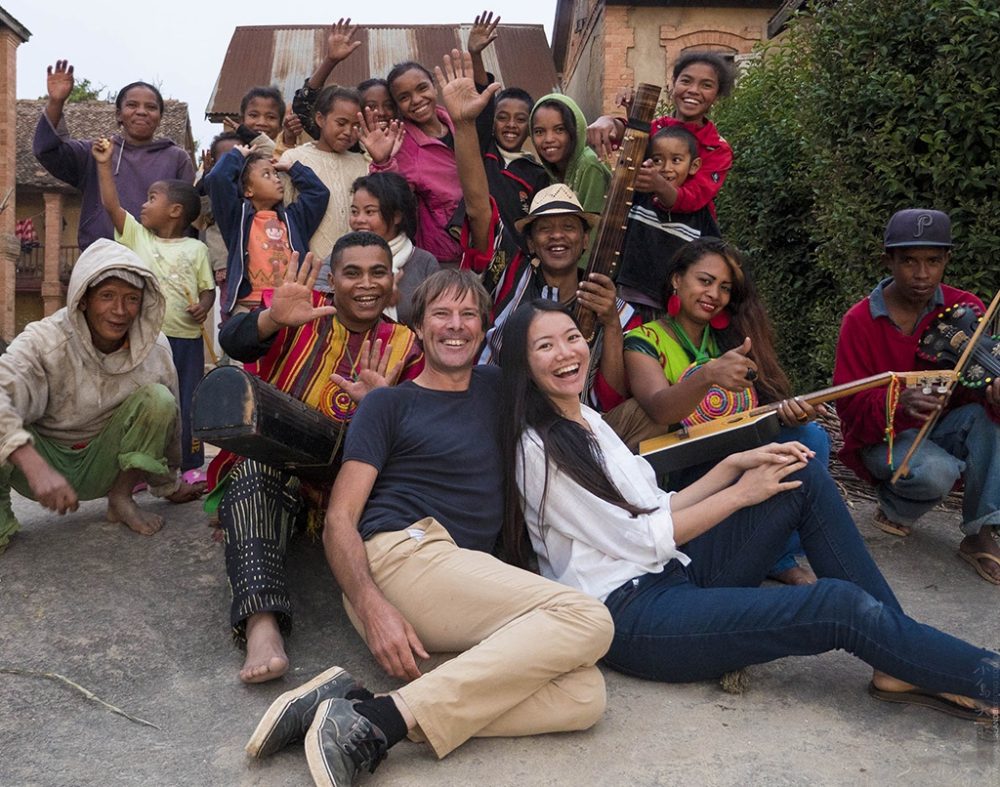
Let's talk about the origins of this project. Tim, I understand that you were involved in film, and that's why this project is so rich with incredible imagery as well as music. The visual aspect is amazing. Tell me how this all came about.
Tim: It's the sum of a few things. One is my background. I began with a band called Not Drowning Waving. We went to Papua New Guinea and made an album called Tabaran, which sort of shaped my musical path from there. I love music production, I love creativity, but working with cultures that have a whole other perspective is different. That's why I talk about culture lineages. I followed that into film, studying film, and I produced lots of albums in Australia: George Telek, Ben Hakalitz, Yothu Yindi, Aboriginal Australia. I spent a lot of time in the desert recording traditional songlines. It was just the most extraordinary thing to experience, with things I never thought I would see being a suburban Melbourne boy.
That led me to taking a job at CAAMA, the Central Australia Aboriginal Media Association. That's Australia's biggest aboriginal owned media house. I was the senior music producer and engineer. And that's how I met BaoBao, out in the desert in central Australia for a couple of years.
BaoBao: And my background: I studied business management back in university, but I wasn't really into money-making, conventional business. I was always searching for the arts. I wanted to work somewhere with meaning. So when I met Tim and we were living in Alice Springs in 2015 when we heard the fifth IPCC (Intergovernmental Panel on Climate Change) report, which talks about how sea level rise is affecting island nations. We thought about the film we had made in Vanuatu. We thought about a lot of the musicians we had met, and within one month we just quit our jobs and hit the road. At that time we didn't have any label or production company. It was just really the two of us. So we began crowdfunding to try to get the project off the ground.
Tim: We started contacting artists with the idea, and building up interest, creating a network. We decided from the start we had to embrace this whole story, from Madagascar to Rapa Nui.
BaoBao: Yes, we were not trying to set up, say, Taiwan collaborating with Madagascar, for example. We wanted to share the big picture, the whole story. And we wanted to include as many voices as we could, so we started recording songs, and we traveled with the songs. We would bring the songs to artists and they would listen and they would improvise on top. And then we would travel to another island. That's how the first album was done. Every song had different layers of musicians’ contributions.
Tim: We didn't tell anyone what to play or what to wear, or where to take us to record. We only said to sing in a language that is from this place. No French, no Mandarin, no English. We wanted the language that speaks of a relationship to this place. The same with the instruments. No guitars. I love guitars; don't get me wrong. But guitar has a relation to a different place. We wanted to hear the valiha or the kabosy or the Polynesian ukulele, which has been changed and altered by local cultures.
Interesting that you mention that. In Polynesia I asked a lot of people where this carved wood construction of the ukulele started. I learned that the double-course strings came about fairly recently, maybe just in the 1980s. But no one seemed to know when the Polynesians came up with this idea of carving the body rather than constructing it as a box, like a Hawaiian ukulele.
Tim: I bet Yoyo Tuki from Rapa Nui would know.
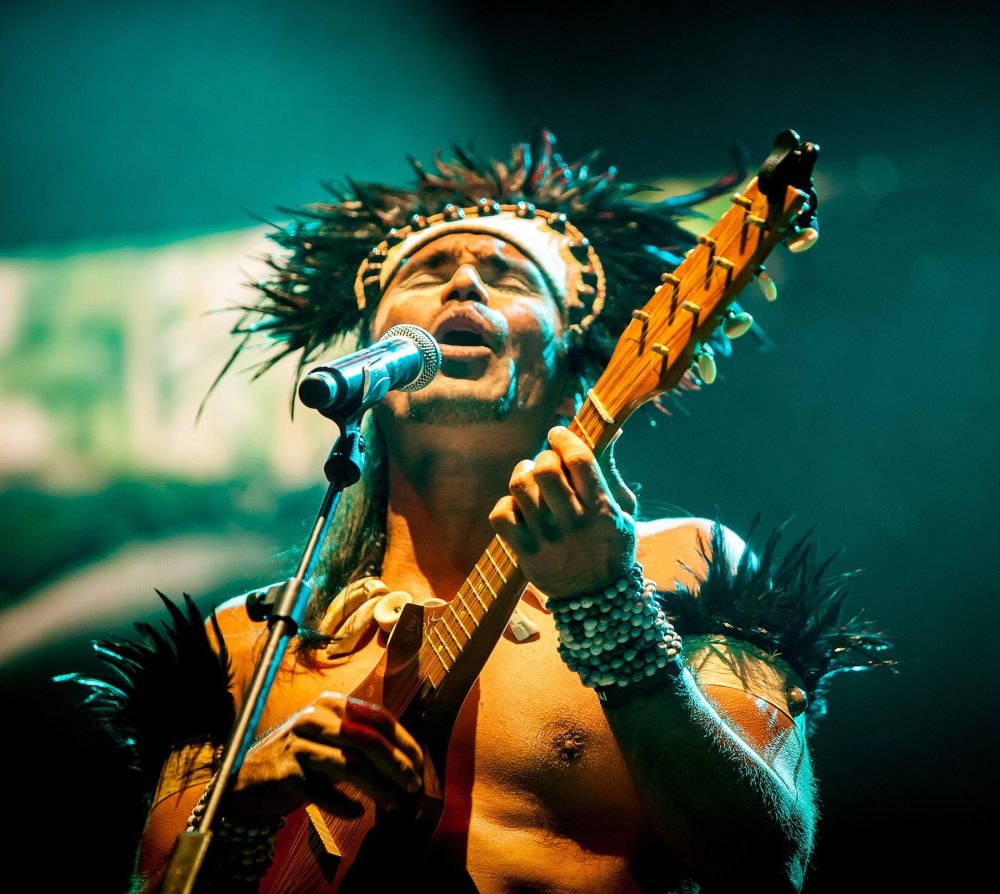
I bet he would, and I’m going to ask you about him in a minute. But I find this instrument fascinating. It's just like the music and the languages; it’s encoded history.
Tim: That's it. Absolutely. We can listen to the lyrics, and the lyrics embody the idea, but for me, the medium is the message. It's the instruments and the artists themselves. They've made choices in their lives to keep their culture going. That's why one thing we’re so proud of, and that humbles us, is when they come together and create. “Why, you are doing the same thing as me in the Trobriand Islands or Papua New Guinea, and here I am in Mauritius!”
That must be very exciting.
BaoBao: It’s powerful. Most of these artists feel kind of alone. They have to fight the mainstream music scene in order to maintain their tradition, and their passion for their traditional music. But when these like-minded musicians meet, it's a very strong bond. Immediately.
Over these seven years, you have worked with a lot of musicians. Do you have any idea how big the Small Island Big Song artist family is at this point?
Tim: I would say over 100.
BaoBao: But Some of them are groups.
Tim: Right. So there are about 40 to 50 acts. And they are all on our website. BaoBao has made an incredible website.
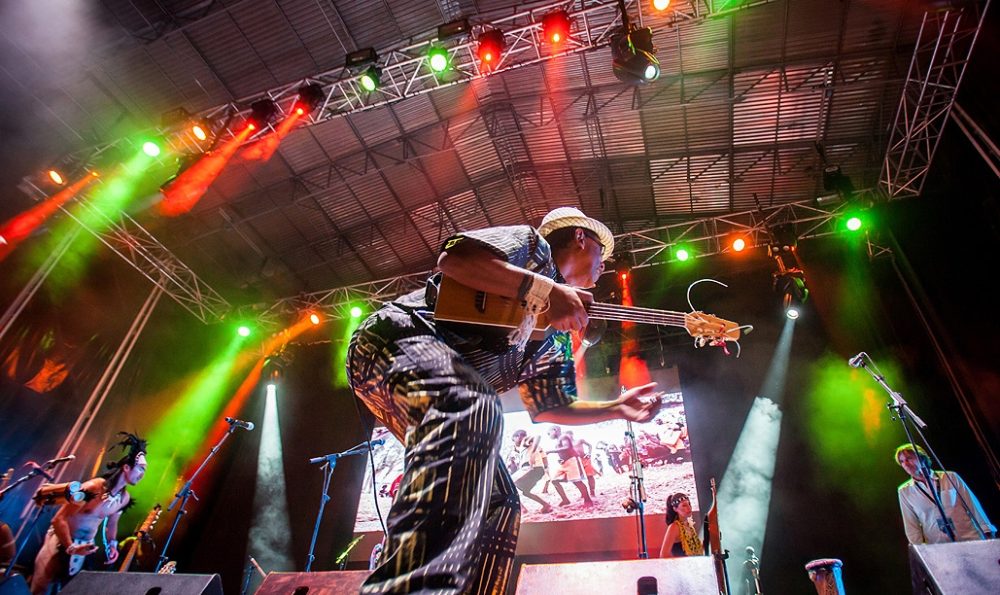
It is amazing. Let's talk about the group you have on this tour. How did you go about bringing these creations to the stage? And how many musicians have you got along?
BaoBao: We started preparing the tour about three years ago. We've been trying to reimagine the project. What else can we do outside of music? Tim has his skill and film. There are live concerts. And there's always education and outreach. We always feel that this is lacking when we tour around the music festivals, because we don't get time to really talk with the audience. We don't get to tell them why we are doing this.
So our agent approached us really liking our project and brought up this idea of actually going to universities and performing arts centers to talk to young people, our next generation. They are still hungry for these stories.
Tim: It's all organized around the climate emergency.
BaoBao: On this tour, we have eight artists. Seven of them are musicians, and then we have Selina Leem from the Marshall Islands. She is a spoken word artist and climate activist. We've been working together the past two years during the pandemic. We couldn't meet in person so we've been meeting online every two weeks. We've been having Zoom conversations. There were more musicians who were part of creating this album. So that's how the album was done, remotely. The touring group actually only met in person about two months ago.
That was in Seattle in January, right?
BaoBao: Yes. Every time we say this during the concert, the audience can't believe it. "Oh my God, you only met three months ago!”
Tim: We actually have three musicians from Mauritius. We really wanted to bring that voice of the Indian Ocean, those rhythms that come from Madagascar and form the basis of sega music. We really see that as a cultural statement of the Indian Ocean. So the idea was to mix it together. Take the sega rhythm with the indigenous voice of Taiwan, the rhythms of Papua New Guinea so that we can create a statement of a united ocean. One ocean.
Let’s talk about the song and video “Listwar Zanset.” It contains the line, "Sometimes I wonder how it was back then." It gets into this whole idea of ancestors and cultural memory. It's something we thought about a lot in Polynesia, because with the arrival of Europeans, so many of these islands had their populations radically reduced, as I mentioned. And then you had missionaries right on the heels of that. So much culture was erased, distorted, confused… So that feeling of wanting to reconnect with things so far in the past is very powerful. I feel that in this song.
Tim: You got it. That's it. But for me, the question was, "Why the ancestors? Why the past?" It struck me that it's not really about the past. It's about the future. We are ancestors. We are ancestors now, and we are part of this lineage and we have a responsibility. It's a big story about our relationship to the earth, to nature. We are the custodians of the moment. That's what I feel the significance is. Of course, this is from an outsider. But for us, this song is extraordinary. It's one that represents the core of this project, everyone bringing their cultural voice and finding that common ground, particularly around the theme of this song, ancestors and our connection to the earth. The earth's relationship to us being severed and broken.
BaoBao: Emlyn from Mauritius wrote this song and proposed it to the group. She wrote it about the slave history that happened in Mauritius. When we got the song, we approached Putad from the indigenous Amis tribe of Taiwan. She felt that her ancestors had a very similar story. They didn't have slavery, but their land was taken from them by colonizers. So she wrote a line responding to Emlyn’s lyrics. And at the end of the song you hear Selina Leem from the Marshall Islands, and she's talking about her land also being taken from them right now, because of sea level rise. So we’re trying to bring together the voices from these three islands—even though they’re so far apart—and talk about the past and the future.
One of the musical through lines in that song is a lamellophone, a kind of mbira. Was that part of Emlyn’s original version? Or did that get picked up along the way?
Tim: The song began with stems from Emlyn, Kokol and Kan from Mauritius. They did it on Garage Band. And that was the original instrument, the sanza they call it. That particular one was made from a tin, a tuna tin. It's a statement about sort of waste and repurposing, because they have a project doing that. And so it began with that, and then came the triangle and the marovany, and that was sent to Putad. That's what she connected to. And then, as these songs go, it went to Sammy in Madagascar with the valiha. He gave lots of layers as well, vocal parts, shakers. And then there were a lot of instruments that didn't get into the final mix.
You must have quite a time editing these things.
It's huge. There is so much in that song, a ukulele line from Tahiti, and electric guitar line that's woven in. Yoyo is in there as well.
So to make this work, you need that kind of musician who is able to listen and understand the sensibility of a piece, and then find a way to add to it without fundamentally changing it. Someone like Sammy is a genius at that; he could collaborate with anyone.
Tim: I love him, a beautiful soul.
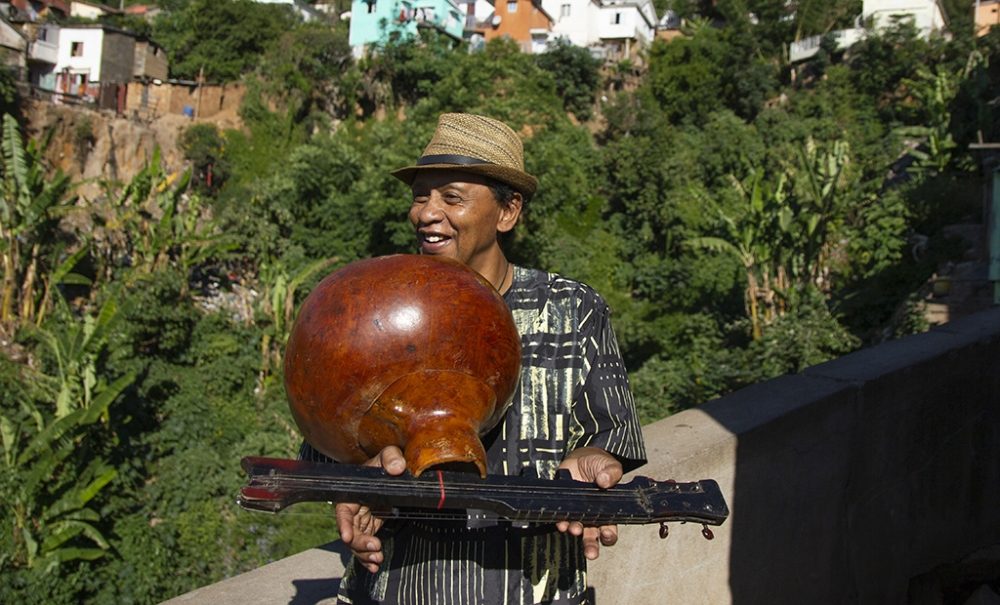
But have you ever found musicians who might be very talented, but they don't have that ability to find their way in something unfamiliar?
Tim: We seek out professional musicians. This is their career path. They know their craft. They know the recording process. They know the language. They carry their cultural lineages with them, but they also know the industry. They know we’re not taking advantage. Everything's done the right way with contracts and that sort of thing. That's very important to keep our integrity, particularly with the first project. We would turn up and record a song with them, sometimes multi-tracking in the field straight away. And then we would play them another song on headphones, and they'd listen to that and go, "Oh yeah, I've got an idea for that." And by the second listen, they'd be jamming on top of it. That's how quickly it happened.
The first album was all done like that. We really did need musicians who knew the process, who could improvise quickly, and if they introduced us to elders and other musicians who are not from the professional stream, we worked with them differently, using these artists as guides. We had to make sure everything was done culturally the right way.
BaoBao: But I think Banning is asking about how it worked musically.
Tim: Well, we are looking for people who are collaborative. That is a keyword for me as a music producer. I don't create music. I bring together musicians who collaborate, and through collaboration, the magic really happens. If we can stretch out the outward part of that circle as far as possible, while holding the center, keeping a core connection to the nature and culture. The diversity in the music itself is huge. The outside of the circle—if we can get that as wide as we can while holding that center, we can create something way beyond what any one of us could imagine.
During the pandemic I imagine you had to work with remote teams to film the musicians and their various locations.
Tim: Yes.
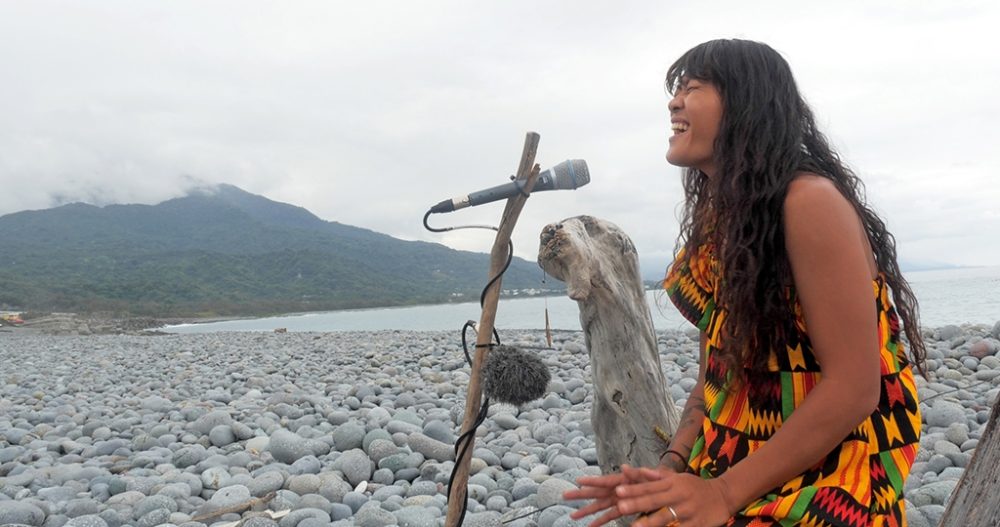
So it was good that you already had a track record and a method. Obviously working remotely complicates everything. But when you get all the tracks together and you edit and mix it into a coherent song, what you end up with is a produced piece of recorded art. But then when you want to bring it to the stage as you are doing now, that must pose a whole new set of challenges. Talk about that.
BaoBao: It’s a really good question. We’re right in the middle of it. If we take this song, “Listwar Zanset,” there's a lot of production that went into it, as you can hear. It wasn't easy to reproduce that live, and we've tried a few different ways. At the end, we just asked Emlyn, “What do you imagine? How would you want it to be presented on stage?" Tim opened up his ProTools and said, “What do you need to support you? I can do playback for individual parts. I can support you with visuals.” And everyone else supports with their instruments and vocals. That's how it came together.
Tim: We also want to bring the narratives of the songs into the show as well. That music video really shows this narrative of connecting to the ancestors through visiting these sort of historical sites, but then taking it from there into the land, and climbing to the top of a mountain, this head of custodial land with the idea of reclaiming culture. Then Selina comes in with the spoken word. We wanted to bring all those visuals into the show as well. We tried with subtitles, triggering them, but it looked like karaoke.
Oh boy. Well, I'll be very interested to see how you solved these problems. Before we go, I want to ask you about Yoyo Tuki. I got in touch with him when I thought our expedition was going to go to Easter Island. Then I started listening to his music, which is really diverse and wonderful. I was hoping to meet him. But he's not on this tour, right?
Tim: He should be. He didn't renew his passport.
BaoBao: Our tour got postponed by one year, and his passport expired. He couldn't get a new one in time.
Tim: He's in Australia, and he couldn’t travel because of COVID.
That's too bad. But he's a very interesting artist. What do you know about his story?
BaoBao: Yoyo was actually our first artist. We met at the Australian version of WOMAD, Omi. We went to see his concert and we just got so inspired, and we went and talked to him and Tim and I just said, "We have to do this."
Tim: We had that inspiration in central Australia, and the next week we left Alice Springs and went to showcase desert music at Omi. Then we saw that there was someone from Rapa Nui, and we had to go see him.
BaoBao: For almost all the shows we did for that first album, Yoyo came along. We went to Europe twice, Taiwan three times. Australia, and America too, SXSW.
Tim: His song on the first album has the most parts, because it was the first song we recorded, so we got to play it for everyone. Some of the other ones didn't get so many tracks.
Before we go, I have to ask about funding. It must've been quite challenging to get to this point. You started out just the two of you. I see a number of government agencies and NGOs cited in the sleeve notes for the first album, but I imagine it's not been easy to fund this thing. It's an expensive project.
Tim: Well, there's a whole lot about the music industry that you're not aware of, actually getting things onto a stage. It's a long process. It took us a year. But the first 20 grants we applied for were depressingly rejected. And then one came through. I couldn't even keep reading these rejections. I would just send the email on to BaoBao. When we finally got one, she was in Darwin and I was in Melbourne.
BaoBao: Tim was calling me and said, "Can you open this email for me. I just can't."
Tim: And when she said, "Yes,” I just burst into tears. It was a really respected one, The Churchill Trust in Australia. They find new ideas to bring back to Australia. They didn't fund our whole trip, but enough to get us going. Then we started to raise more through crowdfunding.
BaoBao: Yes, we did crowdfunding in Taiwan. So that's how we got started, but along the way, it's like a wave, up and down. How to manage that financial wave!
Tim: It's not through music sales.
I'm sure it's not.
Tim: And then BaoBao’s parents let us stay with them during the pandemic. They have a beautiful organic farm right in the center of Taiwan.
BaoBao: We always try to save money on the travel costs, to save more to pay the musicians. We are always trying to expand our vision, even with the little money we have.
I commend you. It's a fantastic project. And I certainly understand about the challenge to keep a long-term project funded. Hats off to you guys for getting this far. I can't wait to see the show. How much of the tour do you have left to go?
BaoBao: Two months. After New York, we’re going up through New England, and then out to California for the end.
Thanks for taking the time. See you at Symphony Space.
Thank you.
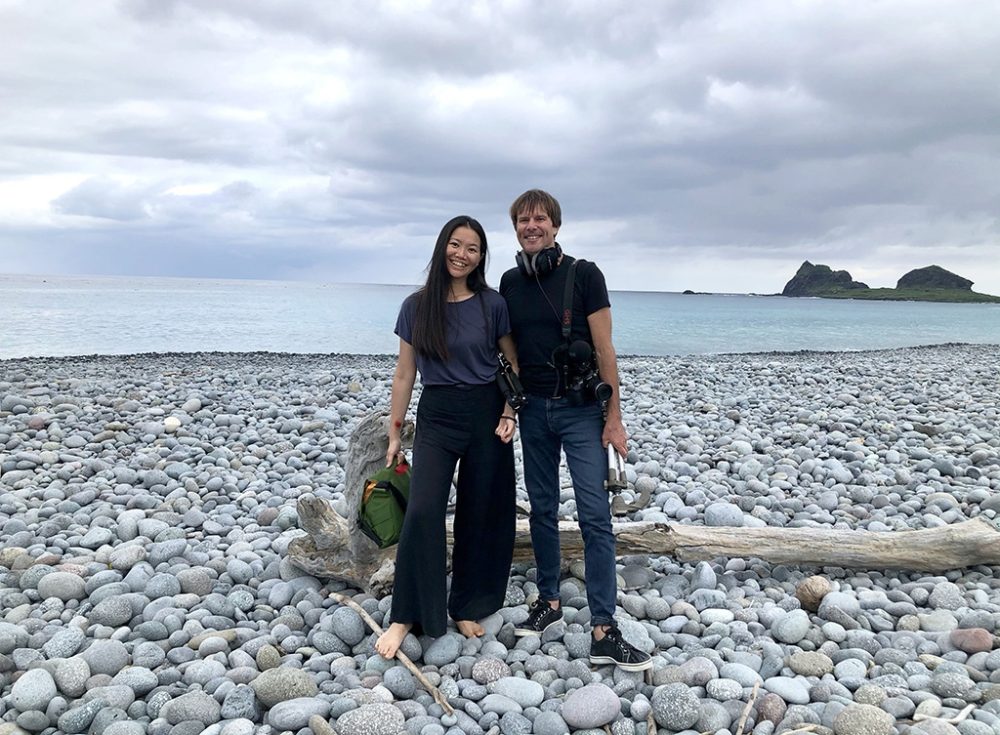
Related Audio Programs
